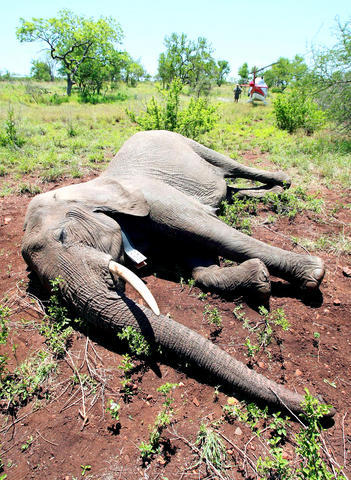South Africa will allow elephants to be killed in an attempt to control a burgeoning population, the government said, ending a 13-year ban and setting a trend that could embolden other southern African nations confronting the same dilemma.
As outraged animal rights activists threaten to promote tourist boycotts, South African Environment Minister Marthinus van Schalkwyk said on Monday the government had no choice but to reintroduce culling "as a last option and under very strict conditions."
There would be no "wholesale slaughter," he promised.

PHOTO: EPA
"Our simple reality is that elephant population density has risen so much in some southern African countries that there is concern about impacts on the landscape, the viability of other species and the livelihoods and safety of people living within elephant ranges," he said.
South Africa has been hugely successful in managing its elephant population, once on the verge of extinction in some areas. But it has become a victim of its own success and herds are growing at a rate of more than 5 percent a year and expected to double by 2020, threatening the delicate balance of nature.
There is no consensus on the continent on how to manage elephant populations. Southern African countries favor culling while East African nations such as Kenya are struggling to keep numbers up. Trade in ivory has been banned since 1989 to try to combat poaching despite appeals by South Africa to resume sales and invest the proceeds in its parks.
"We are the first country to come out and take this decision," van Schalkwyk said, adding that South Africa had consulted other countries in the region.
Monday's announcement follows months of heated debate, with some conservationists arguing that overall biodiversity should take priority and animal welfare groups outraged at the prospect of slaughter.
Van Schalkwyk said the debate was marked by "strong emotions."
The new regulations on managing elephants, effective May 1, say killing must be through "quick and humane methods," preferably by a single lethal shot to the brain by a skilled marksman from a helicopter.
The World Wildlife Fund (WWF) cautiously welcomed the government's move.
"They are doing the responsible thing," said Rob Little, acting chief executive of WWF South Africa. "It is the right choice to have culling as an option but with strong provisos."
However, Animal Rights Africa, which is threatening to promote tourist boycotts, said that killing elephants was "undeniably cruel and morally reprehensible."
Spokeswoman Michele Pickover said South Africa does not have too many elephants and that the decision by the government posed a threat to the elephant population in southern Africa.
She said: "South Africa has opened the door to en masse killing of elephants."
She argued that the decision was linked to its push to have the ban on ivory trade lifted. South Africa has huge stockpiles of ivory but if it succeeded in getting the ban lifted it would "have to keep looking for more ivory," Pickover said.
Bob Scholes, who headed the assessment report of elephant management, dismissed Pickover's claims as "irrelevant."
He said that elephants earned about 18.6 billion rand (US$2.42 billion) a year from tourists and only 1.14 billion rand in ivory, hunting and sales.
"Elephants are worth much more alive than dead," he said.

PARLIAMENT CHAOS: Police forcibly removed Brazilian Deputy Glauber Braga after he called the legislation part of a ‘coup offensive’ and occupied the speaker’s chair Brazil’s lower house of Congress early yesterday approved a bill that could slash former Brazilian president Jair Bolsonaro’s prison sentence for plotting a coup, after efforts by a lawmaker to disrupt the proceedings sparked chaos in parliament. Bolsonaro has been serving a 27-year term since last month after his conviction for a scheme to stop Brazilian President Luiz Inacio Lula da Silva from taking office after the 2022 election. Lawmakers had been discussing a bill that would significantly reduce sentences for several crimes, including attempting a coup d’etat — opening up the prospect that Bolsonaro, 70, could have his sentence cut to

China yesterday held a low-key memorial ceremony for the 1937 Nanjing Massacre, with Chinese President Xi Jinping (習近平) not attending, despite a diplomatic crisis between Beijing and Tokyo over Taiwan. Beijing has raged at Tokyo since Japanese Prime Minister Sanae Takaichi last month said that a hypothetical Chinese attack on Taiwan could trigger a military response from Japan. China and Japan have long sparred over their painful history. China consistently reminds its people of the 1937 Nanjing Massacre, in which it says Japanese troops killed 300,000 people in what was then its capital. A post-World War II Allied tribunal put the death toll

A passerby could hear the cacophony from miles away in the Argentine capital, the unmistakable sound of 2,397 dogs barking — and breaking the unofficial world record for the largest-ever gathering of golden retrievers. Excitement pulsed through Bosques de Palermo, a sprawling park in Buenos Aires, as golden retriever-owners from all over Argentina transformed the park’s grassy expanse into a sea of bright yellow fur. Dog owners of all ages, their clothes covered in dog hair and stained with slobber, plopped down on picnic blankets with their beloved goldens to take in the surreal sight of so many other, exceptionally similar-looking ones.

‘UNWAVERING ALLIANCE’: The US Department of State said that China’s actions during military drills with Russia were not conducive to regional peace and stability The US on Tuesday criticized China over alleged radar deployments against Japanese military aircraft during a training exercise last week, while Tokyo and Seoul yesterday scrambled jets after Chinese and Russian military aircraft conducted joint patrols near the two countries. The incidents came after Japanese Prime Minister Sanae Takaichi triggered a dispute with Beijing last month with her remarks on how Tokyo might react to a hypothetical Chinese attack on Taiwan. “China’s actions are not conducive to regional peace and stability,” a US Department of State spokesperson said late on Tuesday, referring to the radar incident. “The US-Japan alliance is stronger and more